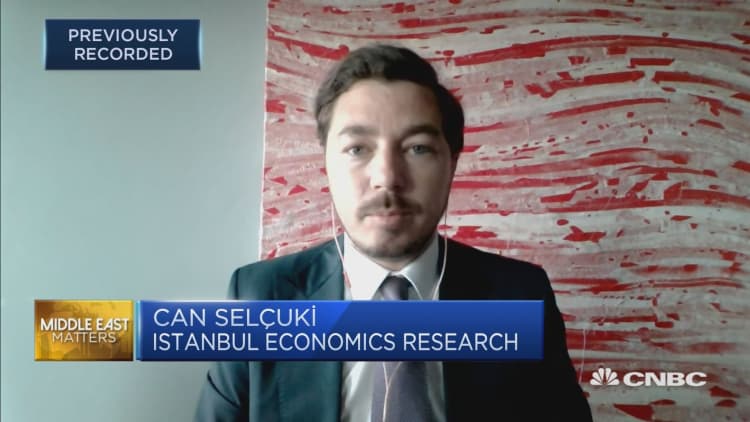The Turkish lira has depreciated rapidly since the turn of the year, recently notching its weakest ever level against the dollar, but analysts suggest the risks are still skewed to the downside.
Only two years after its last currency crisis, the lira was changing hands at just over 7.31 to the dollar on Thursday, with the greenback having gained more than 23% against it year-to-date.
Central to the currency's weakness has been Turkey's unconventional monetary and fiscal policy moves and the diminished independence of its central bank (TCMB). President Recep Tayyip Erdogan sacked former governor Murat Cetinkaya last July in a dispute over high interest rates, prompting an aggressive easing cycle from rates of 24% to 8.25% over the past year.
The government has long intervened to stabilize the currency, but now faces an external financing gap, limited reserves, a deteriorating inflation outlook and rising foreign currency deposits locally, all of which is expected to exert further downward pressure.
Goldman Sachs has raised its three-month USD/TRY outlook to 7.75, but said the medium and long-term direction will depend on the path of policy.
"Moreover, while the TCMB has taken some measures to tighten liquidity, no adjustment of the negative real policy rate has been forthcoming, which raises the risk that policymakers could wait until pressure on the Lira increases before hiking rates in earnest," Goldman Co-Head of Foreign Exchange Kamakshya Trivedi said in a note Thursday.

In gauging how far the USD/TRY spot rate could rally, Trivedi suggested looking at 2018, when the dollar gained almost 50% against the lira in a short time period. He projected that the 2018 move is likely to be the upper bound for a discontinuous ascent in 2020.
This is firstly because standard valuation models are of limited use in assessing the lira at present, Trivedi noted, since the path forward "depends primarily on forces that are 'outside the model': namely, a policy mix that in our view is exacerbating imbalances and eroding inflation credibility in Turkey."
Secondly, foreign positioning in Turkish local assets is much less now than in 2018, Goldman analysts highlighted.
"Third, while the current account balance in Turkey is healthier than in 2018 (while trending in an unfriendly direction in 2020 so far), funding even that from capital inflows is proving harder than in 2018," Trivedi highlighted.
In the long run, Trivedi argued that there is significant interplay between short and long term outlooks at present, with further weakness in the coming days or weeks strengthening an already compelling case for rate hikes, which in turn could put the brakes on lira devaluation further down the line.
Lira defense has 'failed'
Timothy Ash, senior emerging markets sovereign strategist at BlueBay Asset Management, said recent lira depreciation shows an "admission that the hard defense of the lira around the 6.85 level," in a bid to present an image of stability and stem dollarization, had "failed."
"They blew $65 billion in defense of the lira and for little benefit as they are now accepting they have to let the lira go weaker to balance out the external financing requirement," Ash said in a note Thursday.
Ash suggested the defense had capitulated in part because rates were too low, forcing an excess burden onto intervention, compounded by a lack of foreign exchange reserve coverage.
"And low domestic interest rates also stopped capital inflows, they even saw outflows. So they faced a current account deficit, retail demand for FX for dollarization, portfolio outflows and deleveraging also of M< debt and that's why they ended up losing $65 billion in intervention," he explained.
Analysts broadly see a rate hike as necessary to stem the bleeding, but Erdogan's staunch opposition could prove a sticking point. Ash suggested that as in 2018, Erdogan will likely only agree to a hike of the base rate if the lira is in freefall.

